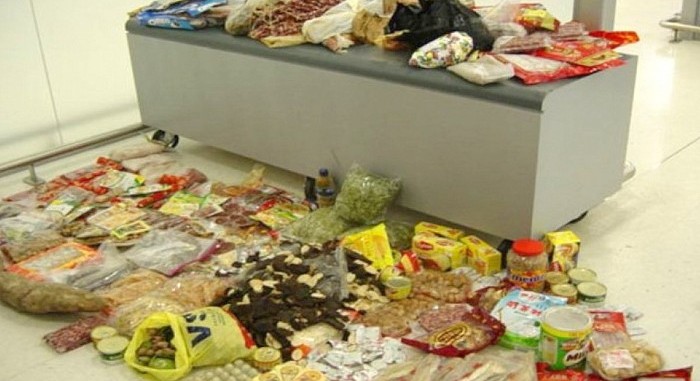Traces of the African Swine Fever (ASF) virus have been found in a sausage from Asia seized in Northern Ireland.
Alert port authorities in Northern Ireland seized 300kgs of illegal meat and dairy products brought in by passengers during June, writes Chris McCullough.
The Department of Agriculture, Environment and Rural Affairs (DAERA) said a sample of these seizures was tested at the Agri-Food and Biosciences Institute (AFBI) resulting in the detection of ASF DNA fragments. “DNA fragments of ASF were detected in a sausage from Asia,” a Department spokesman said.
The Department said that while this type of discovery in itself does not pose a significant threat to the animal health status of Northern Ireland nor does it affect the disease free status from ASF, it does reinforce the importance of the controls on personal imports of meat and dairy products enforced by DAERA officials.
While the authorities are stressing that ASF poses no threat to human health, the virus, which is causing devastation in Asia and is present in a number of European countries, is easily transmitted in pork products. Northern Ireland is only too aware that if ASF entered the country it could have devastating effects, as all exports of relevant agri-food products would be severely restricted damaging the local economy and putting local jobs at risk.
The warnings are clear at points of entry into Northern Ireland from DAERA, which emphasises that meat and dairy products should not be brought into Northern Ireland in passengers’ luggage and that such items may be seized by portal inspection branch staff at local ports and airports.
DAERA chief veterinary officer Dr Robert Huey warned that it is illegal to bring certain food and plant products back into the country to avoid the risks of importing animal or plant disease.
Dr Huey said: “I make no excuses for repeating this message. The greatest risk is to our agri-food industry and our environment, as any introduction of pests, diseases and non-native species can have a potentially devastating impact.
“Ecosystems can be disrupted with significant knock-on effects on agriculture and the local economy.
“Imports of meat or meat products, milk and other dairy products are banned from most countries outside the EU. There are also strict controls on animal products that can be brought in from the EU.
“It is always advisable to check the rules before travel and refrain from bringing back animal products or plants that might be carrying pests or disease.
“Illegal products will be seized and destroyed. Furthermore anyone detected in possession of prohibited items risks prosecution and a fine. So please do not bring any of these products back to Northern Ireland.”
Diseases such as foot-and-mouth cause serious economic impacts and can be brought into Northern Ireland via infected products of animal origin, the Department added. Animal-related products may also pose a risk to human health from diseases, residues or contaminants. Such diseases and pests can have a disastrous effect on livestock, crops or the environment.
Jim Crummie, Daera director of plant health added: “As well as animal products, fruit and vegetables may also carry pests that can infect plants. We are asking people not to bring plants, seeds or plant products back from their holidays.
“An attractive flower or some seeds may seem like an innocent souvenir or present but, unknowingly, pests and diseases can be present. There is also a risk that non-native species may be introduced that can have potentially catastrophic consequences on agriculture, horticulture, forestry and the environment if unchecked,” he said.
NPA chief executive Zoe Davies said the revelation highlighted just how vulnerable the UK pig herd is to ASF infection.
“We have always maintained that the biggest threat to the UK pig herd is from infected meat products that are illegally brought in from infected regions that then find their way into the UK pig herd or feral boar population.
“It is therefore critical that we do everything in our powers to keep infection out of the country, including clear warnings at ports and airports that make the risks and penalties from bringing meat into the country clear to everyone, as well as more proactive surveillance and seizure of illegal meat imports,” she said.
“We also need to ensure, given that the virus might already be present in the country, that all pig keepers are aware of the risks of feeding meat and waste food to pigs, which is, of course, illegal. We are also encouraging producers to put up clear signage on footpaths and other areas of public access close to pig units warning the public not to feed pigs.
“We have launched the industry-wide #MuckFreeTruck campaign to remind everyone across the supply chain and hauliers about the importance of ensuring trucks are clean and not carrying disease. And we continue to urge producers to maintain their biosecurity at all times.”




